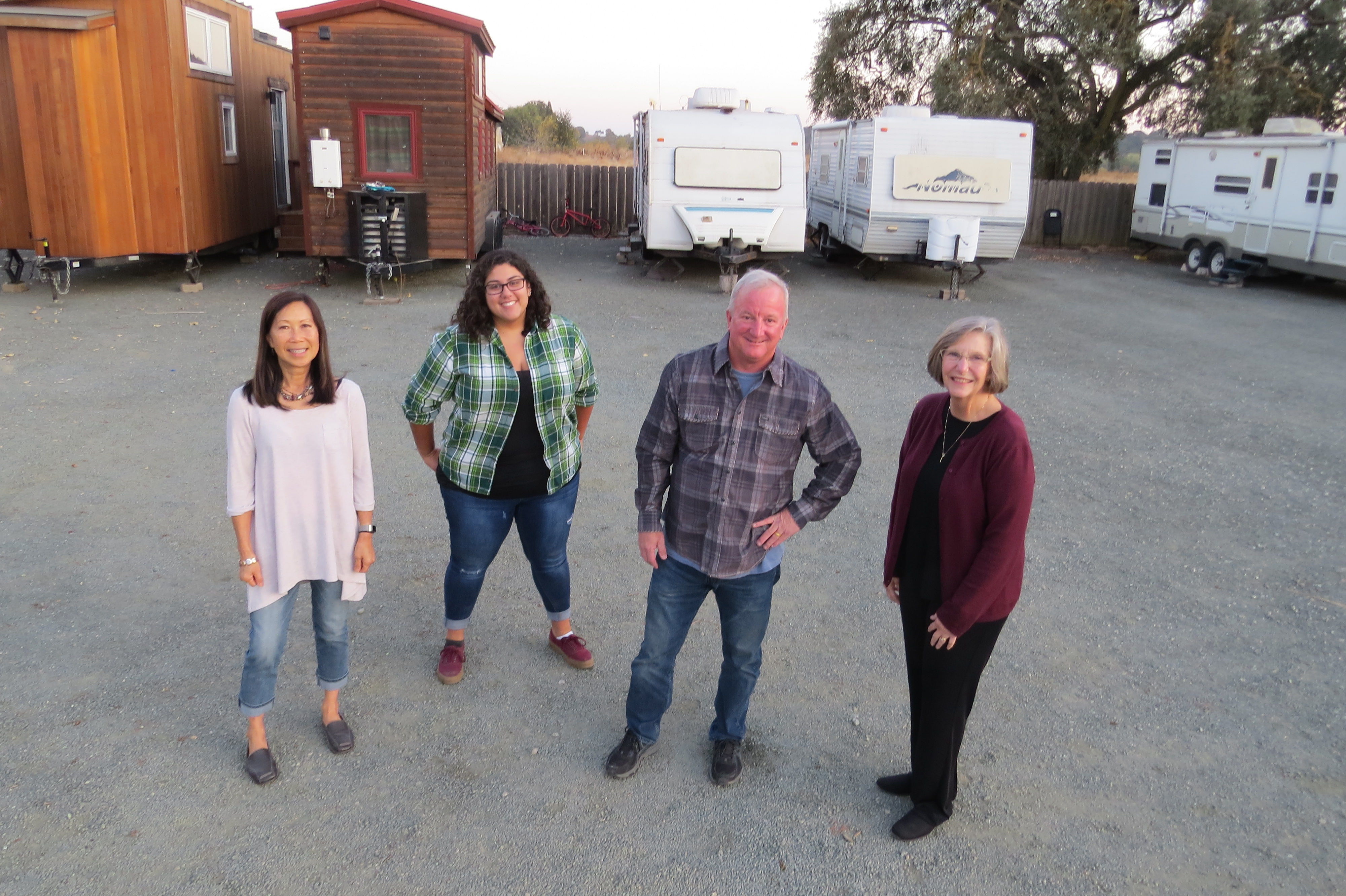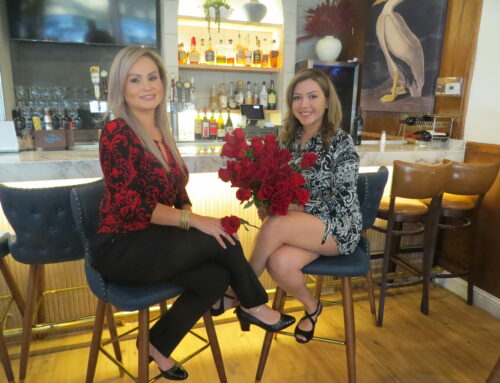Program participants must pass background check

From left to right, Debra Laflin, MH Bible Church volunteer; Janessa Villarruel, case manager with Gilroy Compassion Center; Dirk Caudill, Morgan Hill Bible Church director of operations and Jeanette Thatcher, volunteer from St. Catherine Church. – Photo by Marty Cheek
By Donna Lane
At the hectic intersection where Monterey Road meets Watsonville Road and Butterfield Boulevard, thousands of daily commuters, errand-running residents, and crowded school buses merge on their way to their destinations. Their paths cross, momentarily, before returning to the comfort of their respective homes each night. Half a mile away, six older RVs are compactly arranged side by side in an otherwise bare, gravel lot. A wide stretch of lawn provides a soothing landing spot for weary feet, a covered patio with picnic tables supplies a humble but welcoming spot to eat and socialize, and a peaceful view of the tree-dotted foothills offers inspiration to reflect on life’s blessings and burdens.
But this is no ordinary campsite. During the day, the area is empty. But as evening falls, a group of families with nowhere else to go trickle in, grateful to be off the streets, as part of the safe parking program located behind Morgan Hill Bible Church.
Dirk Caudill, the church’s director of operations explained, “This program started off as a parking lot in June 2017. People living in RVs and other vehicles could come and park. But the city council wanted to crack down on and enforce parking laws. So, they reached out to the interfaith community to try to create a program.”
Carol Lillig and Jeanette Thatcher, both from St. Catherine Catholic Church in Morgan Hill, and Janessa Villarruel, a case manager with the Gilroy Compassion Center, round out the team that runs the safe parking program. Lillig and Thatcher help ensure the site has necessary supplies and interact regularly with volunteers and clients. Caudill oversees site maintenance and improvements and works with case managers.
At first, people camped in tents or slept in their parked cars. But the 2017 winter was particularly cold and wet. Caudill realized that if they could acquire RVs, at least people could stay warm and dry. Like most great ideas, it started with a single donation. Then a church member who’d been impacted by the program donated funds to buy two RVs. Soon, more families had a place to sleep in safety.
Eight households, with a total of about 21 adults and children, now use the RVs parked on the church’s grounds. Five are owned by the church; the sixth is owned by the family who lives in it. A unique feature is the church’s shower and laundry trailer, a luxury that those without homes don’t often experience. The safe parking program allows these families to have a secure place to sleep, eat, shower, do laundry, and spend time together in a less stressful environment. In other words, function as normally as the situation allows. Meanwhile, the support team offers various manners of assistance to help these families get into stable housing.
“What I’m most proud of is the number of children we’ve served,” Villarruel said. “From July 2018 to June 2019, we processed 155 applications and enrolled 66 individuals — 34 adults and 32 children — in the program. And we’ve housed 33 individuals so far, including 20 children and 13 adults.”
That’s a pretty high success rate, all things considered. Perhaps that’s due to some of the unique qualities of the program, such as the shower and laundry trailer, or the fact that members of the Jewish and Islamic communities regularly bring in dinner on Friday nights, when a free, hot meal isn’t traditionally served elsewhere.
But it’s not merely a matter of providing a secure environment for folks to spend the night or a plate of food. One of the most crucial elements in successfully getting individuals and families into secure housing doesn’t cost a penny. And yet, its value is immeasurable. Case workers and community volunteers make a critical difference by offering emotional support.
In order to improve their situation, the program’s participants need guidance and mentorship that comes without judgment. That part of the equation carries a significant weight. And it’s especially true for those who’ve grown weary of the despair that can quickly permeate the lifestyle that stems from a lack of secure housing.
“There’s a level of hopelessness when you’re without secure housing,” Villarruel conceded. “You need a healthy mind frame and healthy coping skills. Some haven’t had that opportunity. We can help by listening to them, reassure them that what they’re feeling is normal.”
The churches encourage volunteers to fill that need for the participants of the safe parking program, to provide those important mentorships and help restore hope for those trying to get back on their feet. And it’s entirely relatable. For so many, a missed paycheck or an unexpected medical bill could put them in the same situation.
“The churches have been amazingly supportive,” Caudill said.
Villarruel added, “We’re trying to foster those relationships, even if all they do is make friendships, with healthy boundaries.”
While everyone agrees more affordable housing is needed, cities everywhere struggle to find solutions to help those who are without homes while that housing is being built. Morgan Hill is no exception. But the issue doesn’t resolve itself overnight. In the meantime, people without homes need a place to go. Safe parking programs are a temporary solution, but they can be effective.
Program applicants are required to go through a background check, must have a valid driver’s license or ID, and have no arrests for violence in the past year and drugs or alcohol over the past five years. The program purposely doesn’t include too many additional services, with the philosophy that in order to become self-sufficient, one must be allowed to be self-sufficient. The program provides enough benefits and incentives for guests to follow the rules while still encouraging them to help themselves.
 “We’re a progressive program,” Villarruel said. “You’re not going to stay here forever. You should have progress while you’re here. Some aren’t cut out for it. Some aren’t showing progress or meeting milestones. But of those who stay, about 50 percent of them move into stable housing. It’s designed to be a short-term stay. But realistically, it takes about eight months to a year to get someone into being stable. We want to give people a foot up with the goal to be self-sustaining.”
“We’re a progressive program,” Villarruel said. “You’re not going to stay here forever. You should have progress while you’re here. Some aren’t cut out for it. Some aren’t showing progress or meeting milestones. But of those who stay, about 50 percent of them move into stable housing. It’s designed to be a short-term stay. But realistically, it takes about eight months to a year to get someone into being stable. We want to give people a foot up with the goal to be self-sustaining.”
On the gravel lot, those donated RVs provide more than shelter. They also provide comfort and hope.





